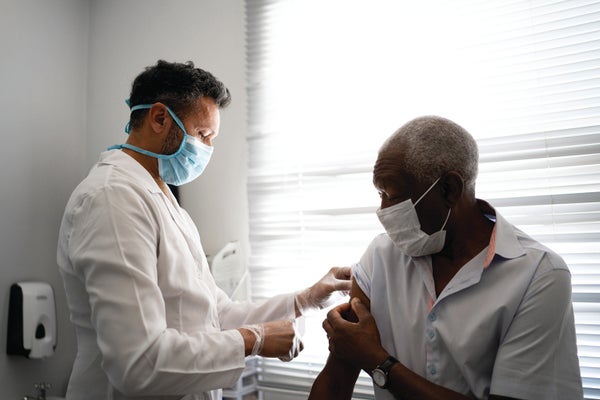Editor’s Note (12/21/21): This article is being showcased in a special collection about equity in health care that was made possible by the support of Takeda Pharmaceuticals. The article was published independently and without sponsorship.
Rarely a day goes by without national news stories about vaccine hesitancy: how many people say they definitely will or won’t get a shot and how many are in the “maybe” box. No account is complete without a particular focus on Black people who—despite contracting, being made severely ill by and dying from coronavirus at elevated rates—express a high degree of reluctance to being injected with something developed to save their lives.
When asked to explain why so many Black people simply don’t trust the federal government with their health, a common answer is “because of what happened at Tuskegee.” Reference to that seminal event has become shorthand for past medical betrayal, abuse and exploitation at the highest levels.
Beginning in 1932, the U.S. Public Health Service dangled the promise of free medical care to recruit rural Black men in Alabama’s Macon County to participate in the “Tuskegee Study of Untreated Syphilis in the Negro Male.” Even after penicillin became widely available as an effective treatment 15 years later, the researchers withheld the drug and watched as the men died or were ravaged by the effects of untreated syphilis.
Based on my reporting and personal conversations with friends and family, it’s clear many people don’t know what happened at Tuskegee. They mistakenly believe the 600 Black men were injected with something bad (syphilis) that made them sick when, in reality, the 399 men who had the disease were denied something good (a dose of penicillin) that would have healed them.
Even many who have the details right learned the wrong lesson from that shameful episode in American medical history. Instead of rejecting vaccines and new therapeutics that are routinely used to successfully treat and cure a majority of the population, Tuskegee should have taught Black people to make a simple demand: give me whatever you’re giving the white folk.
If that had happened 70 years ago, Tuskegee, Ala., might be better known for the historically Black university that bears its name than for a government injustice chronicled in books, movies, plays and congressional hearings.
My home state of North Carolina was one of the first to release coronavirus data by race. The numbers from Charlotte and Mecklenburg County showed the virus’s disparate impact on people of color and were soon confirmed by the skyrocketing COVID-19 rates in other cities with high Black populations.
I saw early on how our well-justified mistrust of public health initiatives, a penchant for baseless conspiracy theories and a misreading of medical history would allow the crisis to take an outsize toll on the Black community.
That’s why months later I decided to participate in the vaccine trials. I wanted to ensure that Black people were adequately represented in the research and to show that the vaccine should be embraced, not shunned. My motives weren’t completely altruistic: clinical trial volunteers were supposed to be at or near the front of the line when a vaccine became available. That couldn’t happen soon enough for me.
While some people thanked me for doing my part for medical science, others were perplexed and even angry that I would become a human guinea pig for the very medical establishment that has used our bodies for experimentation without care or consent.
The data and recent studies show that, rather than being recruited as lab rats, people of color are too often cut out of cutting-edge research. Black people make up about 14 percent of the U.S. population but, on average, only 5 percent of clinical trial participants for disease treatment.
It’s almost taken as a given that our distrust is responsible for the low participation rates. But a study published in the journal Cancer found that some study recruiters viewed racial and ethnic minorities as less promising participants and in some cases reported withholding trial opportunities from them based on these perceptions.
That seemed to play out in the first phase I Moderna trial of 45 people; 40 were white, and two were Black. Pfizer and Moderna said diversity was a priority for their phase III trials to help ensure the vaccines’ safety and effectiveness across populations and possibly reduce vaccine hesitancy; however, underrepresentation of Black people and other groups remained a concern.
My own experience suggests that their recruitment efforts could be improved. Last summer I started applying to participate in the clinical vaccine trials whenever I saw a call for volunteers. It took four applications and more than three months before I was at last selected for the Johnson & Johnson trial in mid-November.
Racism and discrimination in the health-care system show up in the form of neglect, indifference and dismissal. The COVID death toll was higher among Black and brown people because too many had their symptoms dismissed, were turned away from hospitals rather than admitted or were forced to work in dangerous conditions because they were deemed essential.
Much of the fear of the vaccine is prefaced on the assumption that Black people would be expected to go first to make sure it was safe for everybody else. The low numbers of people being vaccinated in the communities hardest hit by COVID-19 show that just the opposite has happened.
